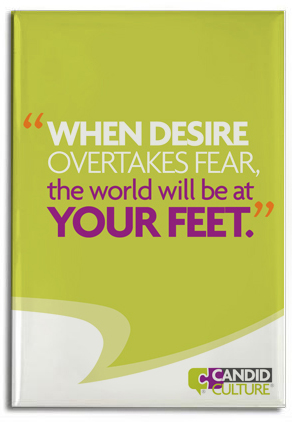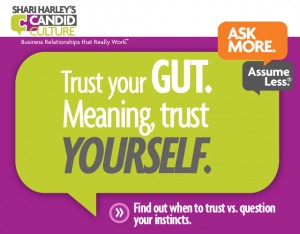Posts Tagged ‘listen’
When I was in college I wrote a paper making the case that most of the decisions we make are based on fear. My professor told me that I wouldn’t want the grade she’d put on the paper and told me to rewrite it. Clearly, she disagreed. Many years later, I still believe the premise of what I wrote. Much of our decision making is fear based.
We make decisions based on fear of what will and won’t happen.
Is that a good decision? What will happen if I say or do that? Will I get in trouble? Will I get what I want, or will there be negative consequences? Will we make or lose money? Will I lose my job? What impression will that decision make on other people?
Fear is pervasive. It hides in our brain and guides our decision making, without us even being aware of its presence.
I’ll never forget driving up to an ATM machine with one of my closest friends from high school. We were 30 at the time, long past high school, and were in a very quiet and safe neighborhood. And yet my friend told me not to go to the ATM machine after dark because it wasn’t safe.
Says who? A long time ago, someone told her that it wasn’t safe to go to an ATM machine at night. And she believed that she’d be robbed at night, at any ATM machine, anywhere, throughout her adult life. Not sound decision making nor a rationale fear.
Regarding decision making, who is running the show, you or your past?
When decision making, you know what’s best for you. When you quiet the noise in your head and listen, you know what to do. Trust yourself.
 Tap into your real desires. When desire overtakes fear, the world will be at your feet. But it can take a lot to even identify that fear is running the show and to know what those desires are.
Tap into your real desires. When desire overtakes fear, the world will be at your feet. But it can take a lot to even identify that fear is running the show and to know what those desires are.
Trust yourself. Not your fear. When fear rears its head, go to a quiet place, literally and figuratively, and ask yourself:
What do I really want? What should I do? You’ll know. Don’t ask 100 people what you should do. Or do ask other people for advice, but be careful with the answers you get. Underneath all that worry and concern, you know what you want. The key is to listen and be willing to trust yourself.
 When I was in college I wrote a paper making the case that most of the decisions we make are based on fear. My professor told me that I wouldn’t want the grade she’d put on the paper and told me to rewrite it. Many years later, I still believe the premise of what I wrote.
When I was in college I wrote a paper making the case that most of the decisions we make are based on fear. My professor told me that I wouldn’t want the grade she’d put on the paper and told me to rewrite it. Many years later, I still believe the premise of what I wrote.
We often make decisions based on fear of what will and won’t happen.
Is that a good decision? What will happen if I say or do that? Will I get in trouble? Will I get what I want, or will there be negative consequences? Will we make or lose money? What impression will that decision make on other people?
Fear is pervasive. It hides in our brain and guides our decision making, without us even being aware of its presence.
I’ll never forget driving up to an ATM machine with one of my closest friends from high school. We were 30 at the time, long past high school, and were in a very quiet and safe neighborhood. And yet my friend told me not to go to the ATM machine after dark because it wasn’t safe.
Says who? A long time ago, someone told her that it wasn’t safe to go to an ATM machine at night. And she believed that she’d be robbed at night, at any ATM machine, anywhere, throughout her adult life. Not a rationale fear.
Who is running the show, you or your past?
You know what’s best for you. When you quiet the noise in your head and listen, you know what to do. Trust yourself.
 Tap into your real desires. When desire overtakes fear, the world will be at your feet. But it can take a lot to even identify that fear is running the show and to know what those desires are.
Tap into your real desires. When desire overtakes fear, the world will be at your feet. But it can take a lot to even identify that fear is running the show and to know what those desires are.
Many of you know I’ve never been married. I’ve found finding ‘that person’ elusive and challenging. This spring I met someone great. And I did everything in my power to make sure the relationship went nowhere. I put up every barrier, citing reasons from my list of dating criteria of why it would never work. My ‘list’ didn’t let me see the person in front of me. I made decisions about him that weren’t true, because I was afraid. It took weeks before I was willing to make the leap, put aside my fears, and be able to hear what my gut was telling me.
Trust yourself. Not your fear. When fear rears its head, go to a quiet place, literally and figuratively, and ask yourself:
What do I really want? What should I do? You’ll know. Don’t ask 100 people what you should do. Or do ask other people for advice, but be careful with the answers you get. Underneath all that worry and concern, you know what you want. They key is to listen and be willing to trust yourself.
The normal, human response to negative feedback is to become defensive. Becoming defensive is a survival instinct, like hitting your breaks when the car in front of you stops short. It’s almost unavoidable.
The challenge with becoming defensive is that the person who risked telling you the truth (as she sees it) doesn’t want to deal with your defensiveness. Your defensiveness is . . . scary, intimidating, annoying – fill in the blank.
So what’s the right answer?
Here’s my recommendation on how to respond to negative feedback:
When someone gives you feedback, listen. Listening doesn’t mean you do what the other person wants. Listening merely means take in the message. Hear what the other person has to say. And ask questions for greater understanding, if you can do so without being defensive. In my experience, asking questions, in the moment, without being defensive is VERY hard to do.
I got critiqued for admitting, in last week’s blog, that I broke one of my own rules by sending feedback via email. I study, teach and write about how to communicate well. And I’m human. Sometimes my emotions get the best of me. But when they do, I clean it up fast.
The last time I got feedback from a friend I got defensive. And during the conversation, right after I became defensive, I caught myself, apologized, and asked the person to tell me again. I said, “I’m sorry I got defensive. Tell me again and I’ll do a better job of listening.”
You won’t always communicate perfectly. It’s not possible. The key is to catch yourself quickly and clean up the messes you make. If you raise your voice, apologize. If you cry, remove yourself from the situation until you can speak calmly. If you push back and defend versus listen, own your behavior and do a better job of listening. You’ll earn respect by admitting when you fall short.
It’s easy to mistake listening to feedback and saying “Thank you for telling me that” as agreement. I’m not suggesting you agree or give in. When you’re calm and can interpret the feedback, without emotion, go back to the person to talk more. It’s ok to push back. It’s ok to say you disagree or that she is mistaken. But if you have this conversation when you receive the feedback, the other person will likely be so daunted by your reaction that she is not likely to give you feedback again, and that’s a loss for you.
So few people will risk being honest with you, make it easy on those who do.
A few weeks ago one of my friends asked for feedback on how he communicated. When I told him what I thought he responded with, “So, you’re telling me I did it all wrong.” Aka, he got defensive, so I back peddled. In that moment my brain got trained, this guy can’t take feedback. So the next time he asks me, I won’t give any.
It doesn’t take much to train people not to tell you the truth. One instance of defensiveness will do it. Don’t do that to yourself. You need the data. You don’t need to agree with what the person says or change your behavior, but you need to know what people think and say about your performance.
Let’s review how to respond to negative feedback:
- Ask for feedback.
- Listen.
- Don’t defend.
- Think about what the person said.
- Wait until you’re calm.
- When you can ask questions and discuss without being defensive, talk further.
Now that you know how to respond to negative feedback, use our Advancing Career Questions to get more feedback:

 Tap into your real desires. When desire overtakes fear, the world will be at your feet. But it can take a lot to even identify that fear is running the show and to know what those desires are.
Tap into your real desires. When desire overtakes fear, the world will be at your feet. But it can take a lot to even identify that fear is running the show and to know what those desires are.

 When I was in college I wrote a paper making the case that most of the decisions we make are based on fear. My professor told me that I wouldn’t want the grade she’d put on the paper and told me to rewrite it. Many years later, I still believe the premise of what I wrote.
When I was in college I wrote a paper making the case that most of the decisions we make are based on fear. My professor told me that I wouldn’t want the grade she’d put on the paper and told me to rewrite it. Many years later, I still believe the premise of what I wrote.
